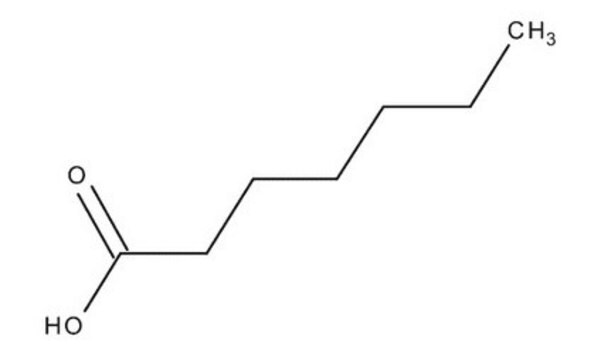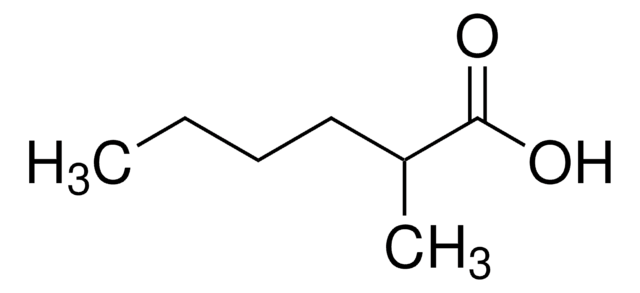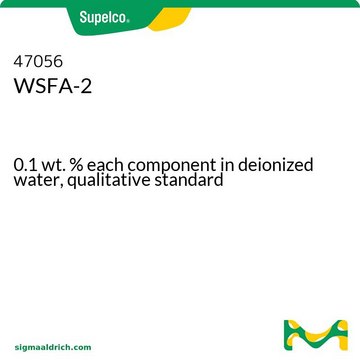75190
Heptanoic acid
≥99.0% (GC)
Sinónimos:
Enanthic acid, Oenanthic acid
About This Item
Productos recomendados
densidad de vapor
4.5 (vs air)
Nivel de calidad
presión de vapor
<0.1 mmHg ( 20 °C)
Análisis
≥99.0% (GC)
formulario
liquid
lim. expl.
10.1 %
índice de refracción
n20/D 1.4221 (lit.)
n20/D 1.423
bp
223 °C (lit.)
mp
−10.5 °C (lit.)
densidad
0.918 g/mL at 25 °C (lit.)
cadena SMILES
CCCCCCC(O)=O
InChI
1S/C7H14O2/c1-2-3-4-5-6-7(8)9/h2-6H2,1H3,(H,8,9)
Clave InChI
MNWFXJYAOYHMED-UHFFFAOYSA-N
¿Está buscando productos similares? Visita Guía de comparación de productos
Aplicación
- For esterification with glycerol to synthesize a triacylglycerol called as triheptanoin or trienanthoin.
- To synthesize 1-hexene via decarbonylation reaction by using platinum nanoparticles supported on carbon.
- To synthesize 7-tridecanone by ketonization in the presence of MnO2/CeO2 or ZrO2 catalysts supported on the surface of alumina.
Palabra de señalización
Danger
Frases de peligro
Consejos de prudencia
Clasificaciones de peligro
Acute Tox. 4 Inhalation - Eye Dam. 1 - Skin Corr. 1B - STOT SE 3
Órganos de actuación
Respiratory system
Código de clase de almacenamiento
8A - Combustible corrosive hazardous materials
Clase de riesgo para el agua (WGK)
WGK 1
Punto de inflamabilidad (°F)
235.4 °F - closed cup
Punto de inflamabilidad (°C)
113 °C - closed cup
Equipo de protección personal
Faceshields, Gloves, Goggles, type ABEK (EN14387) respirator filter
Elija entre una de las versiones más recientes:
¿Ya tiene este producto?
Encuentre la documentación para los productos que ha comprado recientemente en la Biblioteca de documentos.
Los clientes también vieron
Artículos
Separation of Propionic acid; Acetic acid; Heptanoic acid; Isobutyric acid; Valeric acid; Isocaproic acid; Butyric acid; Isovaleric acid
Separation of Methyl oleate; Caprylic acid; Heptanoic acid; Methyl decanoate; Methyl dodecanoate; Myristic acid; Methyl palmitate; Methyl palmitoleate; Methyl stearate; Methyl linoleate; Methyl linolenate; Acetic acid; Arachidic acid; Behenic acid; Propionic acid; Isobutyric acid; Valeric acid; Isovaleric acid; Isocaproic acid; Butyric acid
Protocolos
In this study, SPME was used for the analysis of free fatty acids in Parmesan cheese using a 65 μm Carbowax/divinylbenzene (DVB) SPME fiber. Headspace extraction of the cheese sample was conducted at 65 °C for 15 minutes and analyzed by GC with FID detection. SPME is ideal for analyzing the volatiles associated with solid food samples. The phase chemistry of the Nukol GC column provides excellent peak shape of acidic compounds.
Nuestro equipo de científicos tiene experiencia en todas las áreas de investigación: Ciencias de la vida, Ciencia de los materiales, Síntesis química, Cromatografía, Analítica y muchas otras.
Póngase en contacto con el Servicio técnico










